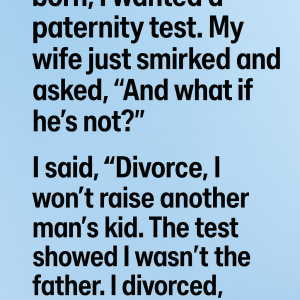
When the sliding glass doors of St. Mary’s Maternity Center opened, Nurse Carol murmured, “Take care of yourself, dear,” in a voice that almost sounded warm. But her eyes were cool, clinical as if she were looking at a number on a chart instead of a new mother.
A few yards away, families with balloons and champagne clustered around beaming parents. A young father cradled his newborn like a miracle. But for Marissa Hale, no one waited. No flowers. No camera flashes. Just her and the tiny baby swaddled against her chest.
She stepped out into the crisp April air, glancing up and down the street for the taxi she had booked an hour ago. It was nearly four. No sign of it. Her pulse quickened not because of the ride, but because she had no idea where to go once she got in.

Two years ago, she’d been a university junior in Raleigh, thriving on a scholarship. Then she met Logan Pierce — older, charming, quick with promises. She left the dorm for his loft, convinced she’d found the person she’d marry.
But when she told him she was pregnant, his warmth evaporated. “That’s not my plan,” he’d said flatly over the phone. By her eighth month, Logan’s mother arrived to deliver the final blow: Logan was marrying his boss’s daughter.
The memory stung as her taxi finally pulled up, the driver grumbling about traffic. Marissa stayed silent. Listening to his complaints was easier than replaying the scene at Logan’s front door that afternoon — him saying, “Not my problem,” and slamming it in her face.
The cab dropped her near a row of brick walk-ups. She wandered until she found a basement door propped open. Inside was damp concrete, a battered couch, and the faint smell of mildew. It wasn’t safe, but it was a roof. She laid her daughter on a clean diaper atop the couch and tried to rest.
A rough voice jolted her awake. “This ain’t your spot. Move along.” A red-faced man stood in the doorway, arms crossed. Fear pushed her back into the night.
By midnight, she’d walked several blocks. Light glowed from a ground-floor window where potted geraniums lined the sill. Desperation overcame pride. She knocked.
An elderly man with silver hair and a painter’s smock opened the door. “Evening. You look cold,” he said gently.

“I… I don’t have anywhere to stay,” she admitted, her voice barely audible.
He studied her, then stepped aside. “Come in before you freeze.”
His name was Walter Grady, a retired art teacher who lived alone. He made her tea, found an old cradle in the attic, and told her she and the baby could stay as long as they needed.
Weeks turned into months. Walter introduced her to a friend who ran a craft shop downtown. Marissa began knitting baby hats and blankets for sale, working by lamplight while her daughter, whom she named Sophie, slept. The orders grew, and so did her savings.
Eventually, she rented a tiny room nearby. Walter refused to let her thank him with money. “You gave me company,” he said simply.
Over the next three years, Marissa’s knitting grew into a home-based business. She posted her designs online, and orders came from across the state. Then one autumn afternoon, a tall man walked into her small rented studio.
“I’m Dean Callahan,” he said, extending a hand. “I own a chain of children’s boutiques. Customers have been raving about your work. Let’s talk partnership.”
The deal transformed her life. She hired help, expanded her product line, and — over time — found herself looking forward to Dean’s visits. His kindness toward Sophie was unforced, and Marissa realized she was no longer bracing for betrayal.

One spring, Dean invited them both to dinner. Conversation flowed easily, laughter came without effort, and when Sophie insisted Dean join their bedtime story, Marissa knew something in her life had shifted again.
Years later, her brand — “Sophie’s Harbor” — had storefronts in four states. She launched a foundation to teach sewing and knitting to single mothers, pairing them with mentors and helping them find housing.
At the ribbon-cutting for a new training center, Marissa spoke to a small crowd. “No one should have to face the world alone with a newborn in their arms. I know, because I’ve been there. Sometimes, all it takes is one open door.”
After the applause faded, a woman approached. Her lined face stirred a distant recognition. “I’m Logan’s mother,” she said quietly. “I came to apologize. You’ve built something beautiful.”
Marissa felt no anger, only a strange lightness. “Thank you,” she said. “I hope he finds his way.”
That evening, as she watched Sophie and Dean planting flowers in their backyard, Marissa thought of that cold night outside St. Mary’s. The fear, the uncertainty and the door that opened when she needed it most.
Now, she was the one holding doors wide. And this time, she wasn’t letting them close.





